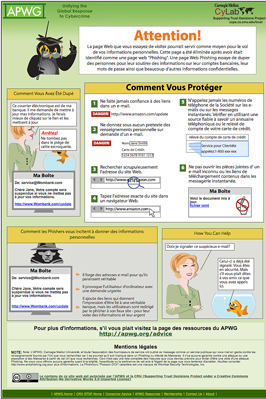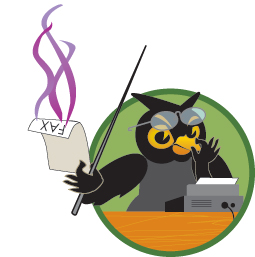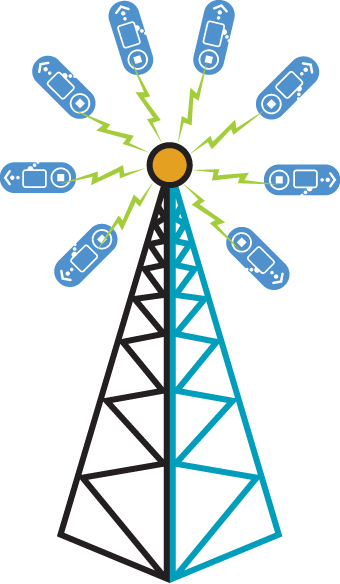Direct advisories and instruction for users [See: diagram, right] who have exposed themselves as the most vulnerable to the absuses attendant cybercrime and;
Broad and persistent reminders for all users who need consistent and regularly applied nagging to avoid doing dopey things with their data and IT devices at home and at work. [See: STOP. THINK. CONNECT™ campaign, below.]
Direct Intervention for At-Risk Users
 In its inaugural program, the APWG and Carnegie Mellon CyLab's Supporting Trust Decisions Project launched the Phishing Education Landing Page Program in August, 2008. That program redirect consumers and enterprise users who've clicked on links in phishing campaigns to instructional materials that explains that they have just fallen for a phishing communication (email or otherwise) and advises them on how they help themselves avoid being victimized in the future. It will respond in one of 21 languages with these advisories - with more in translation today.
In its inaugural program, the APWG and Carnegie Mellon CyLab's Supporting Trust Decisions Project launched the Phishing Education Landing Page Program in August, 2008. That program redirect consumers and enterprise users who've clicked on links in phishing campaigns to instructional materials that explains that they have just fallen for a phishing communication (email or otherwise) and advises them on how they help themselves avoid being victimized in the future. It will respond in one of 21 languages with these advisories - with more in translation today.
Any ISP can use the Landing Page assets to replace phishing websites (or the all-too-ubiquitous 404 'not found' server error message) at no cost and with almost no bandwidth burden. Point your browser to education.apwg.org/r and check it out today. Stump the system with a language it doesn't handle? Sent a note to info@apwg.org with the subject "I stumped the landing page" and we'll get right on it.
 The APWG's Fax Back Phishing Education Program instructs consumers about protecting themselves against offline phishing scams almost as soon as they fallen for one. APWG hosts educational cover sheets that ISPs and FoIP hosting providers can use to automatically fax back warnings to customers who've sent information to fax numbers that were taken out of criminal control.
The APWG's Fax Back Phishing Education Program instructs consumers about protecting themselves against offline phishing scams almost as soon as they fallen for one. APWG hosts educational cover sheets that ISPs and FoIP hosting providers can use to automatically fax back warnings to customers who've sent information to fax numbers that were taken out of criminal control.
Cybersecurity Awareness Messaging
The The APWG and NCSA's STOP. THINK. CONNECT. Messaging Convention brought together an unprescedented public/private partnership of dozens of international companies and goverment agencies to craft essential online safety and security messaging instruments that can be used as foundational advice by all businesses, government agencies and NGO's advising consumers about staying safe and secure online.

Initially proposed by APWG in Spring 2009, the program proposed unified messaging as the antidote for uncoordinated, discordant cybersecurity awareness messages that were offering increasing content without coordinating efforts to provide the resonance required for retention of messaging principles.

The APWG and NCSA and Messaging Convention Organizers from industry and government completed the intial project in 14 months and officially launched its STOP. THINK. CONNECT.™ awareness slogan and logo in October 2010.

Today, the Messaging Convention has signed Memordandums of Understanding with Canada, Panama, Paraguay, Uruguay, Dominica, Jamaica, Japan, Spain and Switzerland with dozens of other nations currently examining and processing the agreement and expected to come on stream in coming months and years. More than 300 commercial enterprises, government agencies and NGOs have adopted the STOP. THINK. CONNECT.™ and more enter into partnership with the Messaging Convention every day.
The objectives of the Convention are as clear and vital today as they were at conception of the campaign in 2008: A unified campaign of consistent messaging will impart principles of stronger impulse control to IT users to arrest the responses to cybercrime events before they cause damage - and embue them with more resilient habits of IT user hygiene in every dimension of engagement with ICT technology and information.
Users As Counter-Cybercrime Activists

The APWG has been taking reports from the general public, as well as its members and data correspondents for well over a decade.
Those reports allow APWG's members to retrieve upwards of 100 million records per day of cybercrime events. The value to industry and civil society of this clearinghouse function is immeasurable and deserves cultivation like all of APWG's many counter-cybercrime programs.
Starting in 2016, the APWG will be promoting cybercrime reporting more broadly as a civil virtue and as a cooperative enterprise that can help industry work togeher to neutralize cybercrime without harming their own commercial interests.
The SEE CYBERCRIME | REPORT CYBERCRIME slogan will be a keystone media asset to be shared by APWG and its reporting campaign partners to remind consumers and enterprise users of the opportunities they have to take a stand against cybercrime by reporting events to the APWG.
At the same time, APWG will be promoting
Accredited Reporter program among its members and correspondents, in order to secure larger numbers of institutional contibutors with substantial flow of event reports to contribute to APWG clearinghouses. Contact
reporter@apwg.org for more information.